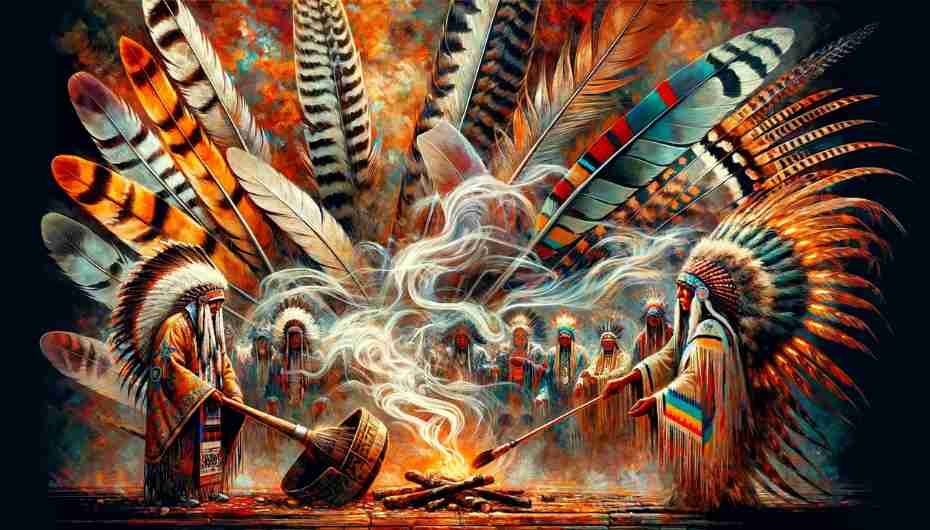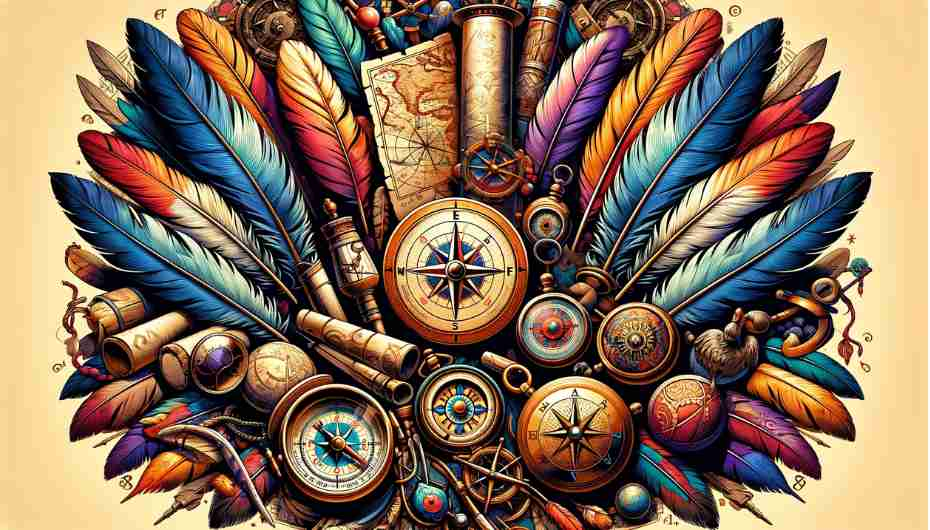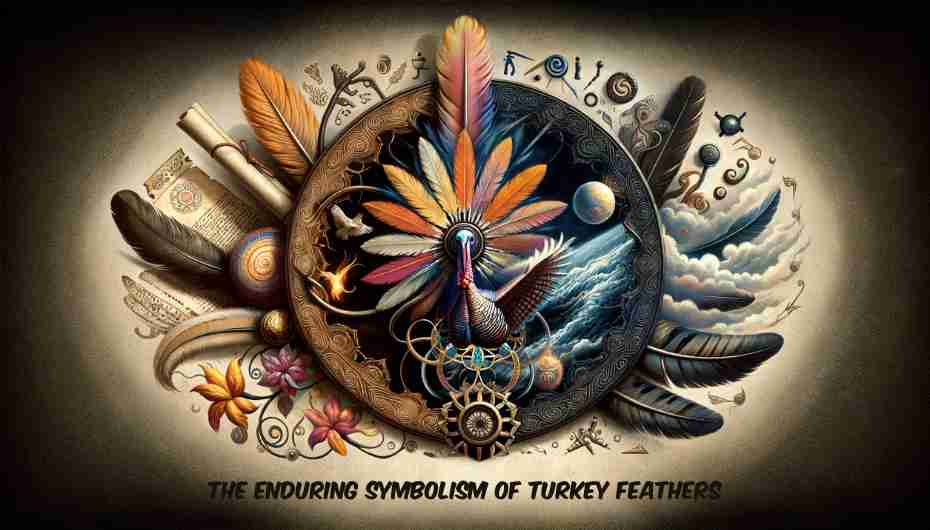Turkey Feather Symbolism: A Legacy of Insight

What is it about the feather that so stirs the human spirit? Maybe it’s the delicate strength, or the dance between earthly and ethereal it performs so well.
I meditate upon the turkey plume specifically and how it came to nest within so many civilizations’ hearts and minds…as a bridge between worlds for Native shamans, as a harbinger of unseen realms for pagan Europeans, as a wellspring of magic for modern artisans and healers.
What timeless chord does this common artifact strike within us all? Let us ponder the turkey feather’s teachings – simple yet containing multidimensional wisdoms.
Key Takeaways:
| Symbolic Context | Symbolism |
|---|---|
| Native American | Abundance, fertility, gratitude |
| European Folklore | Exotic, protection, strength |
| Modern Symbolism | Nature, spirituality, creativity |
| Color Significance | Groundedness, mystery, purity, magic |
| Superstitions | Good luck, spiritual messages, divine connection |
| Artistic Representation | Freedom, transformation, spirituality |
| Timeless Appeal | Connection to nature, diverse meanings |
The Symbolism of Turkey Feathers in Native American Culture
In Native American culture, the turkey holds a special place as a symbol of abundance, fertility, and gratitude. The turkey feather, in particular, is revered for its connection to the natural world and the spiritual realm.
It is often used in sacred ceremonies and rituals, where it is believed to carry the energy of the turkey spirit.
The Meaning of Turkey Feathers in Native American Culture
In Native American culture, each part of the turkey holds specific symbolism. The feathers, in particular, are associated with:
- Abundance: Turkey feathers are seen as a symbol of abundance and prosperity. They are believed to bring good fortune and wealth to those who possess them. The vibrant and intricate patterns found on turkey feathers represent the richness of the natural world and serve as a reminder of the abundance of resources provided by Mother Earth.
- Fertility: The turkey is closely associated with fertility and the cycle of life. Its feathers play a significant role in rituals related to fertility and childbirth. Native American communities believe that the turkey’s ability to reproduce and provide sustenance for its young reflects the cycle of life and the interconnectedness of all living beings. Turkey feathers are often used as talismans during ceremonies seeking fertility and the blessing of new life.
- Gratitude: The turkey is a symbol of gratitude and appreciation for the gifts of the earth. Its feathers are used to express thanks and honor the natural world. Native Americans have a deep respect for the environment and the creatures that inhabit it. Turkey feathers are a tangible way to acknowledge the interconnectedness between humanity and the earth. During ceremonies and rituals, they are employed to express thanks for the abundance of food, shelter, and resources that sustain life.
The Use of Turkey Feathers in Native American Rituals

Turkey feathers are integral to Native American rituals and ceremonies, serving as conduits to connect with the spirit world and express gratitude. Their versatile use extends beyond symbolism:
- Smudging Ceremonies: In smudging ceremonies, turkey feathers play a vital role. They are used to fan the smoke from burning herbs, such as sage or sweetgrass. This fragrant smoke is believed to cleanse and purify the energy of individuals, spaces, or objects. The gentle, rhythmic motion of the feather is seen as a means to distribute the healing energy of the herbs evenly, creating a sacred and purified atmosphere.
- Regalia and Dance: Turkey feathers hold a prominent place in Native American regalia. Dancers often incorporate them into their attire, whether as fans, headdresses, or other decorative elements. The feathers are not only a symbol of cultural identity but also an embodiment of the turkey’s qualities, such as abundance and fertility, which are invoked during traditional dances.
The Role of Turkey Feathers in Spiritual Connection
Beyond their practical applications, turkey feathers are deeply spiritual. They are considered to carry the essence of the turkey spirit, acting as intermediaries between the earthly realm and the spirit world. When used in ceremonies, they are believed to facilitate communication with the divine and ancestral spirits, forging a connection between the present and the unseen realms.
Variations in Turkey Feather Symbolism Across Tribes
It’s important to note that the symbolism of turkey feathers can vary among different Native American tribes and nations. While there are common themes of abundance, fertility, and gratitude, each tribe may have unique interpretations and uses of turkey feathers in their cultural practices. These variations reflect the diverse traditions and beliefs that enrich Native American culture.
Turkey feathers hold deep symbolic and spiritual significance in Native American culture. They symbolize abundance, fertility, and gratitude, serving as conduits to connect with the spirit world. Whether used in smudging ceremonies, traditional dances, or as part of regalia, turkey feathers continue to play a vital role in preserving and expressing the rich cultural heritage of Native American communities.
The Symbolism of Turkey Feathers in Ancient European Folklore

In ancient European folklore, the turkey feather was also imbued with symbolism and meaning. While turkeys are native to the Americas, their feathers were introduced to Europe after the discovery of the New World. As a result, turkey feathers became associated with new and exotic discoveries, as well as the qualities of the bird itself.
The Meaning of Turkey Feathers in Ancient European Folklore
In ancient European folklore, turkey feathers were often associated with:
- Exotic Discoveries: The introduction of turkey feathers to Europe symbolized the discovery of new and exotic lands. They were seen as a symbol of exploration and adventure.
- Protection: Turkey feathers were also believed to have protective qualities, warding off negative energy and evil spirits.
- Courage and Strength: The turkey, as a bird of the wild, was seen as a symbol of courage and strength. Its feathers were often used to invoke these qualities in rituals and ceremonies.
The Use of Turkey Feathers in European Traditions
In Europe, turkey feathers were used in various traditions and rituals to harness their symbolic qualities. They were often incorporated into ceremonial headdresses and clothing, where they were believed to confer the qualities of the turkey onto the wearer. Turkey feathers were also used in divination and fortune-telling, where they were thought to bring insight and protection.
Contemporary Symbolism of Turkey Feathers

The symbolism of turkey feathers continues to hold significance in modern times, transcending cultural and geographical boundaries. While the traditional meanings endure, turkey feathers have also come to symbolize new ideas and concepts in contemporary society.
The Modern Symbolism of Turkey Feathers
In contemporary culture, turkey feathers hold various symbolic meanings and associations. They serve as reminders of our connection to the natural world and underscore the importance of preserving the environment. Many people see turkey feathers as tangible symbols of the Earth’s beauty and the need to protect and respect the environment that sustains us.
Additionally, turkey feathers have a significant role in spiritual practices and healing rituals. They are believed to carry positive energy and are often used to promote well-being. When incorporated into these practices, turkey feathers are thought to enhance spiritual connection and foster a sense of inner harmony and healing.
Moreover, the intricate patterns and vibrant colors found on turkey feathers inspire creativity and self-expression. This quality has made them popular in various forms of arts and crafts. Artists and artisans often incorporate turkey feathers into their creations, infusing them with both aesthetic appeal and symbolic depth. This blend of creativity and symbolism allows individuals to express themselves while connecting with the profound meanings associated with turkey feathers in contemporary culture.
| Symbolism | Description |
|---|---|
| Connection to Nature | Turkey feathers are seen as a reminder of our connection to the natural world and the importance of preserving the environment. |
| Spirituality and Healing | Turkey feathers are used in spiritual practices and healing rituals, where they are believed to carry positive energy and promote well-being. |
| Creativity and Expression | The intricate patterns and colors of turkey feathers inspire creativity and self-expression, making them popular in arts and crafts. |
The Use of Turkey Feathers in Modern Practices
In modern society, turkey feathers are utilized in various ways to harness their symbolism and beauty. They are often incorporated into:
- Fashion and Accessories: Turkey feathers are used in fashion and accessories, such as jewelry, hats, and clothing, as a symbol of style and individuality.
- Home Décor and Crafts: Turkey feathers are popular in home décor and crafting, where they are used to create unique and artistic pieces.
- Spiritual and Healing Practices: Turkey feathers are used in spiritual and healing practices, such as energy cleansing and meditation, to promote a sense of peace and harmony.
The Symbolism of Turkey Feathers in Different Colors
The color of a turkey feather can also hold specific symbolism and meaning, adding another layer of depth to its significance. Different colored feathers are associated with various qualities and attributes, each carrying its own symbolism.
Symbolism of Turkey Feathers by Color
| Feather Color | Symbolism |
|---|---|
| Brown | Groundedness, stability, and connection to the earth. |
| Black | Mystery, protection, and the unknown. |
| White | Purity, peace, and spiritual enlightenment. |
| Iridescent | Magic, transformation, and the mystical. |
The color of a turkey feather can influence its symbolic meaning, and individuals may choose feathers of specific colors based on the qualities they wish to invoke or honor.
Finding Turkey Feathers in Nature: Superstitions and Symbolism

Discovering a turkey feather in nature can evoke a sense of wonder and curiosity, leading to various superstitions and symbolic interpretations. Throughout history, finding a turkey feather has been associated with different beliefs and omens, depending on the culture and context.
Superstitions and Symbolism of Finding Turkey Feathers
The act of finding a turkey feather in nature carries various superstitions and symbolic interpretations across cultures and beliefs. For many, it is seen as a harbinger of good luck and positive energy, believed to bestow blessings and protection upon the person who discovers it. Some view finding a turkey feather as a message from the spirit world, conveying guidance, comfort, or reassurance in times of need.
Additionally, there is a belief that stumbling upon a turkey feather is a connection to the divine, serving as a symbol of divine intervention and a reminder of the presence of higher powers in our lives. Lastly, there is a notion that finding a turkey feather can signify the manifestation of one’s desires and intentions, potentially bringing them to fruition.
These interpretations add mystical and spiritual significance to the simple act of finding a turkey feather in nature, turning it into a symbol laden with meaning and possibility.
| Symbolism | Description |
|---|---|
| Good Luck | Sign of positive energy and protection. |
| Messages from Spirit | Believed to convey guidance and comfort from the spirit world. |
| Connection to the Divine | Seen as a symbol of divine intervention. |
| Manifestation of Desires | Thought to signify the realization of one’s intentions. |
Turkey Feathers: Symbolism in Art and Literature

The symbolism of turkey feathers has also been depicted in art, literature, and folklore, where they serve as powerful metaphors and motifs. Artists and writers have drawn inspiration from the symbolism of turkey feathers to convey deeper meanings and themes in their work.
Symbolism of Turkey Feathers in Art and Literature
In art and literature, turkey feathers serve various symbolic purposes, embodying profound meanings within the creative context:
- Symbol of Freedom and Liberation: Turkey feathers frequently serve as symbols of freedom and liberation in art and literature, embodying the breaking of barriers and the pursuit of independence.
- Metaphor for Transformation: Within the realm of symbolic art and literature, turkey feathers function as metaphors for transformation, symbolizing personal growth, change, and evolution.
- Representation of Spirituality: Artists and writers often utilize turkey feathers to represent spirituality, transcendence, and the intricate connection between the physical and spiritual realms.
| Artistic Use | Description |
|---|---|
| Freedom and Liberation | Symbols of breaking barriers and pursuing independence. |
| Metaphor for Transformation | Represents personal growth, change, and evolution. |
| Representation of Spirituality | Conveys spirituality, transcendence, and the connection between the physical and spiritual realms. |
The symbolism of turkey feathers has inspired countless artistic and literary works, enriching the cultural landscape with their profound meanings and interpretations.
The Enduring Symbolism of Turkey Feathers

The symbolism of turkey feathers has stood the test of time, weaving its way through diverse cultures and traditions to remain relevant in today’s world. Whether as a representation of abundance and gratitude in Native American culture, a symbol of exotic discoveries in ancient European folklore, or a modern-day emblem of creativity and spirituality, the turkey feather continues to hold deep and multifaceted significance.
The Timeless Qualities of Turkey Feather Symbolism
The enduring symbolism of turkey feathers is rooted in timeless qualities, including:
- Connection to Nature: Turkey feathers serve as a reminder of our interconnectedness with the natural world, promoting a sense of reverence and stewardship for the environment.
- Spiritual Significance: Across cultures, turkey feathers are associated with spiritual practices, healing rituals, and the pursuit of inner harmony and enlightenment.
- Symbolic Diversity: The symbolism of turkey feathers encompasses a wide range of meanings, from abundance and protection to freedom and transformation, reflecting the complexity of human experience.
Embracing Turkey Feather Symbolism Today
In contemporary society, the symbolism of turkey feathers continues to be embraced and celebrated in various forms, including:
- Art and Fashion: Artists and designers incorporate turkey feathers into their creations, infusing them with symbolic depth and aesthetic allure.
- Spiritual Practices: Turkey feathers are utilized in meditation, energy cleansing, and other spiritual rituals, serving as conduits for positive energy and intention.
- Cultural Appreciation: The enduring symbolism of turkey feathers invites cultural appreciation and understanding, fostering respect for diverse traditions and beliefs.
The symbolism of turkey feathers transcends time and culture, embodying a rich tapestry of meanings that resonate with people around the world. Whether as a symbol of gratitude and abundance, a metaphor for transformation and freedom, or a source of inspiration and creativity, the turkey feather continues to captivate the human imagination and spirit.
Its enduring significance serves as a testament to the profound and timeless power of symbolic expression.